Hello, Chef Numra from Empress Market here. If you’re new to my substack, this is the place where I write about my desi heritage and how I reflect it back through my cooking on my Empress Market dinner table.
I am a woman who is led by her stomach.
Some people eat to live, I, my friend, wake up thinking about what I’ll eat for the rest of the day and maybe, even the day after. I’ve been like this since birth. My mum likes to recount how the doctor instructed her to put me on a diet (it was the 80s!) when she was breastfeeding me, how I powered through three jars of baby food in one sitting as a toddler, or how, one summer, I ate so many mangoes, I developed a mild allergy, breaking out into blisters all over my body. I wasn’t allowed to eat mangoes for a long time after that, which was a tragedy.
I’ve always enjoyed my food. As the years have gone by, my love for eating has lured me into the kitchen, to cook what I’d like to eat, and express who I am.
I cook only because I love to eat.
Today I am sharing two menus and two stories - one that will be cooked by me (alongside the fabulous Chef Monga) and the other cooked for me by my Khala Jaan.
So first things first, I’m here to plug my Summer Supperclub.

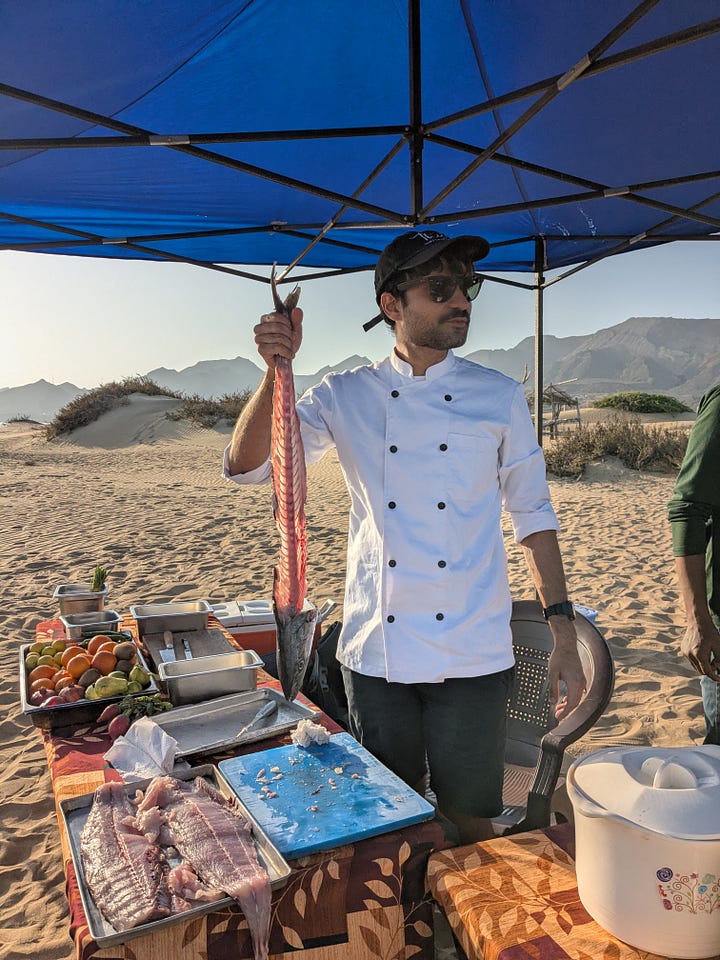
On 18th June, Wednesday, Chef Asad Monga and I will be cooking a Pakistani summer feast in the gilded, sun-soaked South London Louie.
I’ve been following Asad Monga on instagram for some time now, excited by how he invigorates desi flavour and ingredients with his creativity. He’s certainly one to watch, a rising star from Pakistani bawarchikhanas, with his work featured in Duniya Digital and the debut print issue of Vittles. Sign up to his best selling retreats to Hunza or along the Sindh coastline; perhaps you can join me when I’m there in March 2026!
When Asad messaged me that he’s in London this summer and keen to collaborate on a supperclub, I jumped at the chance.
Inviting another chef to join you in the kitchen is the ultimate act of respect. Our kitchens are our safe space. It’s a sacred space where us chefs conjure up magic. Allowing another chef to share the space is not something we take lightly.
From our first conversation I knew the respect for each other was mutual and Asad was just as excited to work with me, as I was with him. Ideas for our dishes flowed naturally, as we messaged each other late into the night about what and how we love to cook. The resulting menu for our collab summer pop-up tells the story of both of us, from beginning to end.
Paharon say Samandar tak, from the Mountains to the Ocean.
The menu for the “Paharon say Samandar tak” supperclub champions seasonal local produce cooked with desi flair. Each dish feels at once nostalgic and new, bringing a fresh perspective to the Pakistani dinner table. The menu is a conversation about what Pakistani cuisine looks like in the future.
The dastarkhan is abundant, the conversation exciting, this is what it means to be Pakistani today.
The “Paharon say Samandar tak” supperclub is now SOLD OUT!
We might just be organising a second sitting on 19th June, Thursday so if you’d like to attend the supperclub and experience the full story of what us Pakistani chefs, reply to my substack ;)
This brings me to the next order of business. Being fed.
When someone cooks for you, it is an unsaid act of love.
Now I don’t mean being wined and dined at a restaurant or at a large banquet where you’re part of a large faceless crowd. I’m talking about when someone cooks from the heart, especially for you. Dil say binaya hai.
I have eaten food cooked by my Khala Jaan’s hand many times. My mum’s elder sister has played a key role in rearing my siblings and I. We’d spend the summer with my cousins rollerblading down my Khala’s Tooting street or running to the Rookery in Streatham near my childhood home. Eating at Khala Jaan’s or food cooked by my mum were one and the same thing growing up.
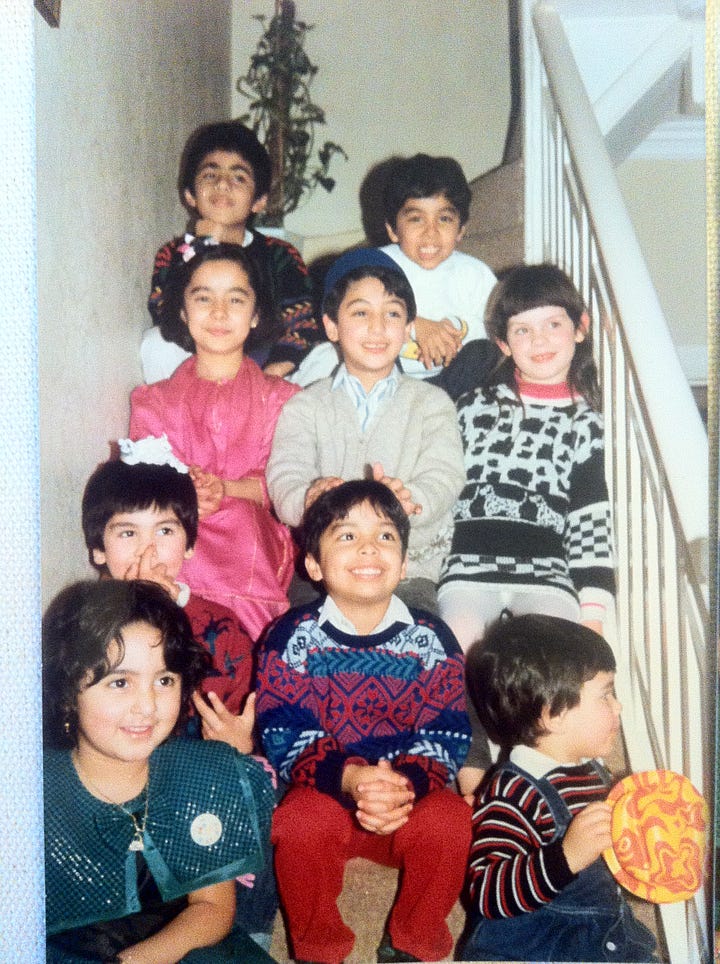
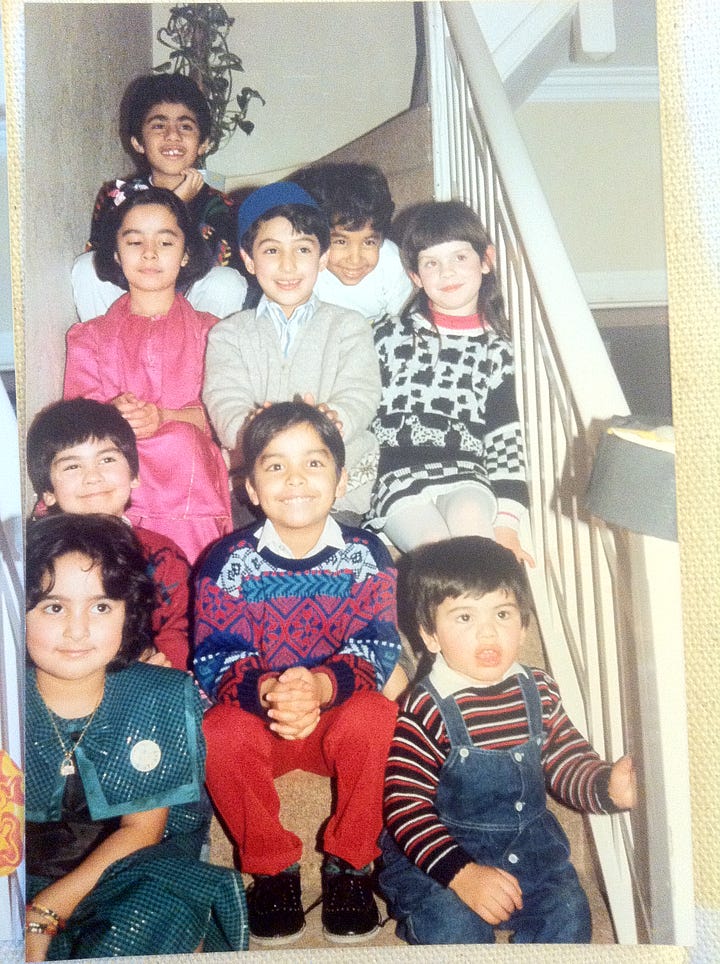
Khala Jaan has ways that are unique to her - she never picked out the cloves before making us her keema aloo toasties. The memory of biting into the surprise pepper and licorice like woody buds still makes my skin crawl. She only stocked Shredded Wheat in her breakfast pantry. I’ve never met anyone else who loves the cereal more than her and I strongly believe my Khala Jaan’s single handedly kept the shredded wheat business afloat all these years. And, most importantly, she refuses to arrive empty handed. Invite my eldest aunt over for dinner and she will ring your bell with one, two, if not three dishes in tow, and my Khalo Jaan shuffling behind her with an ‘I don’t know what to do with her’ expression on his face.
Khala Jaan is a feeder. It’s what I love about her the most, and I like to think I inherited this trait.
We celebrated Khala Jaan’s 70th birthday this May, so it feels heartwarming to write about the way she can make me feel special.

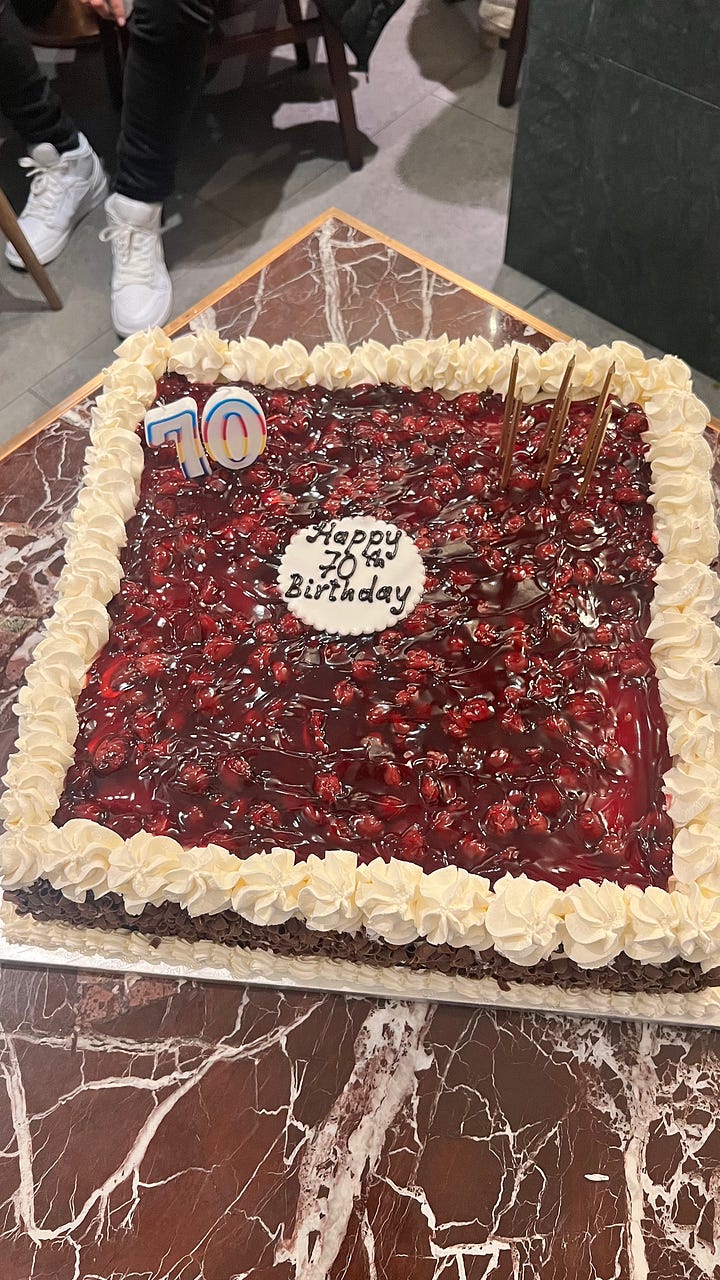
Khala Jaan has cooked food I’ve eaten many times, sure, but the Dawat she served just for me (and my husband, chalo!) is one I will keep close to my heart forever.
Keeping with desi riwaj, shortly after my wedding, my eldest aunt formally invited my husband and I for dinner. This is a Pakistani tradition where the family elders invite the newly married couple to their home. This is not only a gesture to welcome the new partner into the fold; the Dawat is an active gesture to recognise the beginning of a new chapter in the newly-wed couple’s life.
I’ve been invited as an extended guest to a few of these dinners over the years, assisting my mum in the kitchen as she hosted similar Dawats for my cousins. Every little gesture at these events takes special meaning to celebrate the Mehmaan Khaas of the evening. The guests of honour are invited to the table first, ahead of the other elders. Gone are the days when the bacha party are relegated to the lounge, precariously balancing their plates on their knees as they eat. The bride and groom are now amongst the adults, ushered to the best seat in the house, in front of the main dish, often an opulent platter of Biryani or Nihari. They’re served first helpings, including the VIP’s favourite dishes cooked especially for them. The likes of bhindi or suhki mung daal become opportunities to tell tales of a happy childhood and the strong connections of our extended family.
At my Khala Jaan’s home it was my (and my husband, yes yes he was there too) turn to be Mehmaan Khaas. We were celebrated as the most important people in her home.
My husband and I arrived with a bouquet of flowers and a box of fancy chocolates.
“Khala Jaans’s an amazing host, we’re in for a treat” I told my husband with anticipation as I rang the bell.
My Khala opened the front door with her lips painted her signature red, planting a warm kiss on both my cheeks as she welcomed us in.
“The house smells lovely Khala Jaan”. “I’ve been cooking since this morning,” she replied with glee.
She hurried off to the kitchen and returned with a tray of fruit juice.
“Oh Khala Jaan, please don’t be formal, hum ghar ki baath hai”. I said as I sheepishly took a glass from the tray.
“You may be at home here but you and Asaad are the VIPs tonight,” She said with a cheeky smile and returned to her magical lair.
I followed her into the kitchen where my mum was playing assistant that evening. The two women were busy heating the food and plating for service.
Without looking up, my Khala Jaan gave a stern warning, “You’re not working today Numra”.
And so I watched in awe as she prepared a meal I would have thought impossible to prepare in her four stove burner, two metres by four galley kitchen. The menu was the result of pure alchemy, a Dawat for one to marvel. She counted portions of rice under her breath as she plated, ladled saalan into platters and sprinkled coriander as garnish with one final flourish.
Truth be told, the food was in such abundance, I yearned for the capacity to eat seconds. The Dawat, much like Khala Jaan’s love was in excess. Even when taking small portions of every dish, the meal consumed me instead of the other way round.
I was filled to the brim by the time dessert came out.
Gurr Chawal, sella rice cooked in a jaggery syrup, with sliced coconut and raisins, topped with a single sheet of silver leaf for decadence. There is always room for dessert and so with a cup of chai, I took single and double portions of the sweet rice.
Gurr Chawal, the recipe
I am sharing the recipe for Khala Jaan dessert just as she shared it with me. I plan to recreate the dish as soon as I finish drafting this substack and I’ll share the results on instagram (give me a follow if you’re notalready!). From the sounds of it, Gurr Chawal is an easy dessert to cook, perfect for a Sunday afternoon or even Eid which is on Friday!





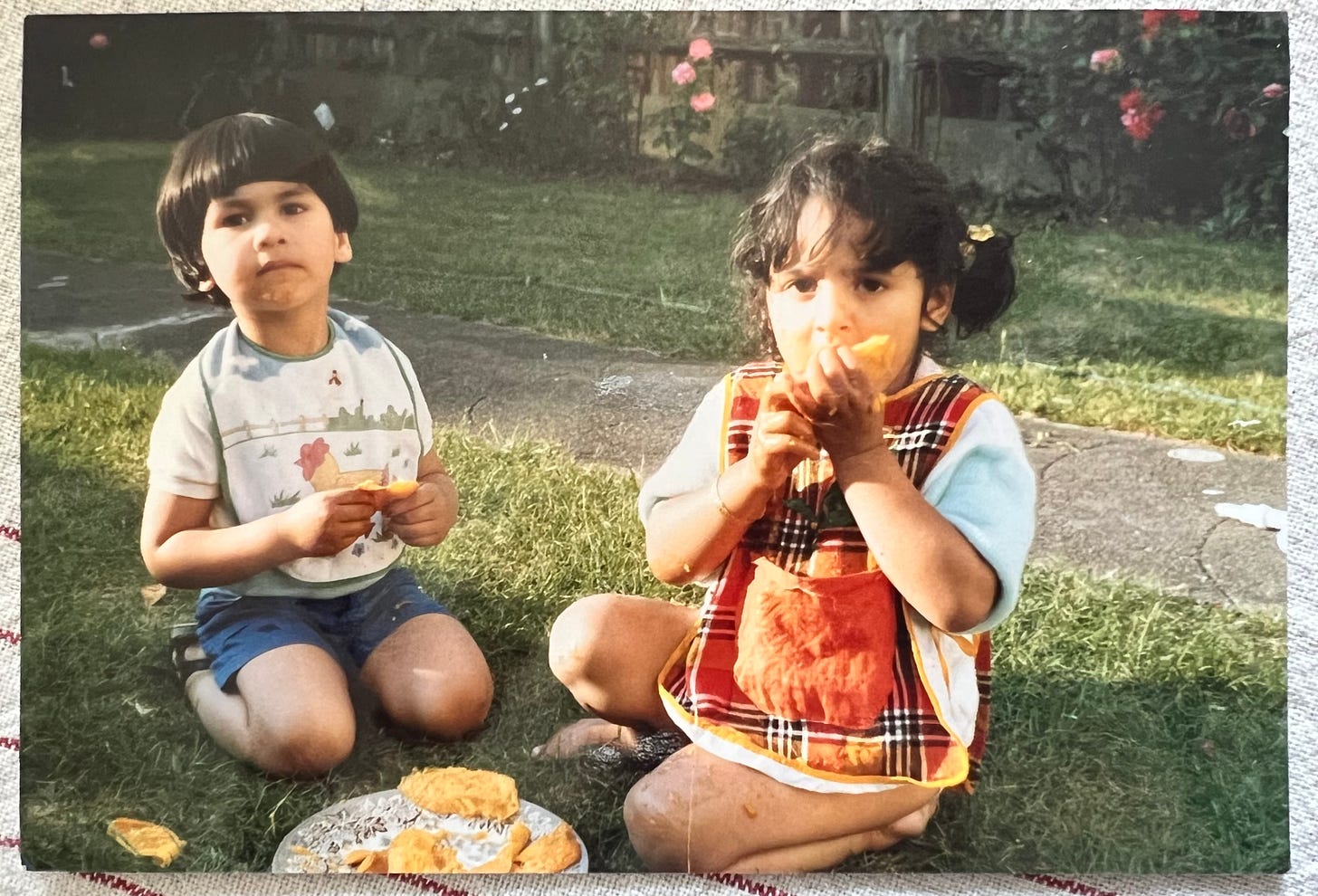






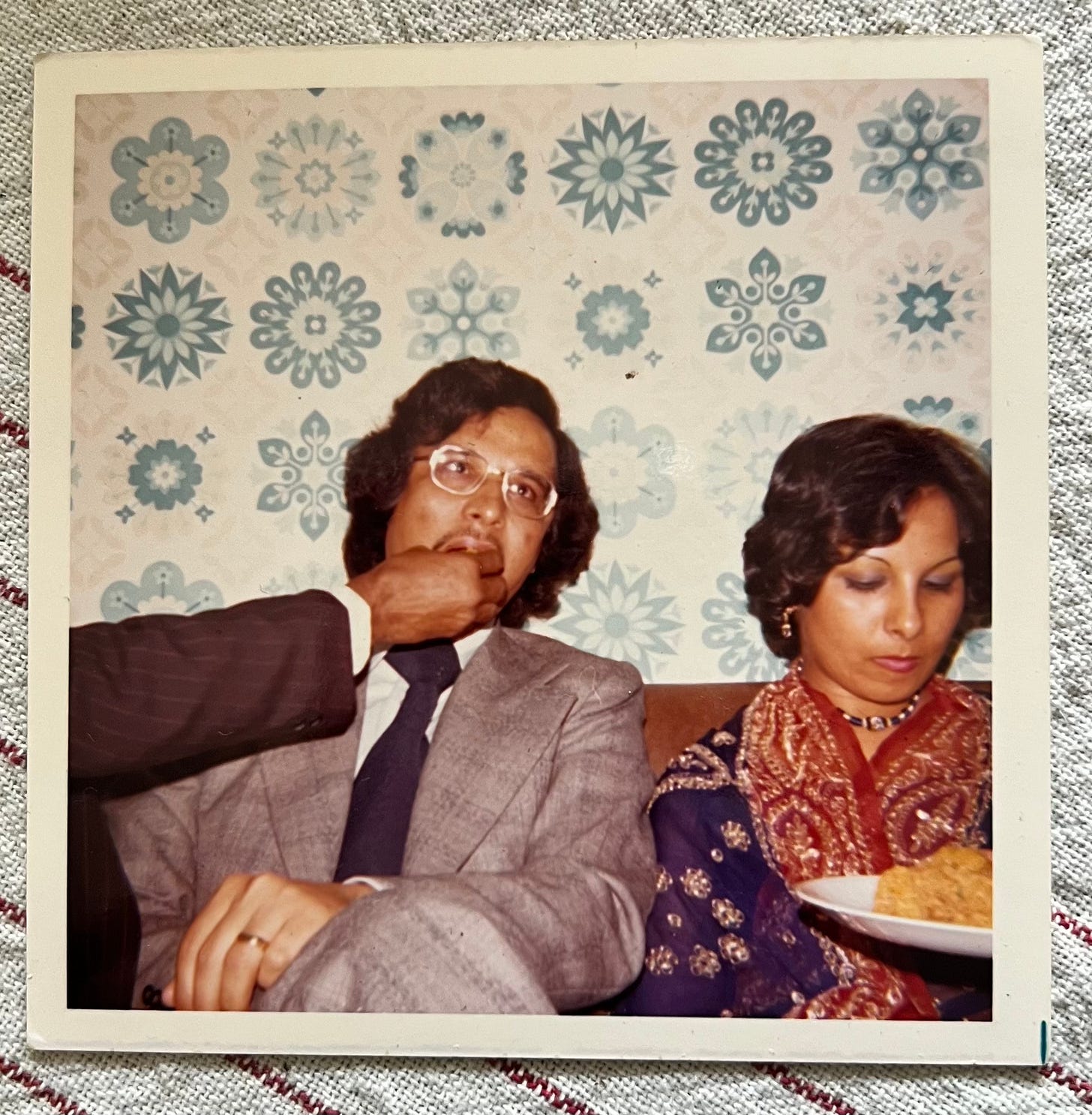


Excellent narrative, you have eyes on everything Numra! , well done setting new standards from a galley kitchen, wonder if she had larger working space to cook, tooting will be on another planet, a missed opportunity- Ahmed’s kitchen…
Beautiful written as always, evoking memories, emotions and nostalgia. Xxx